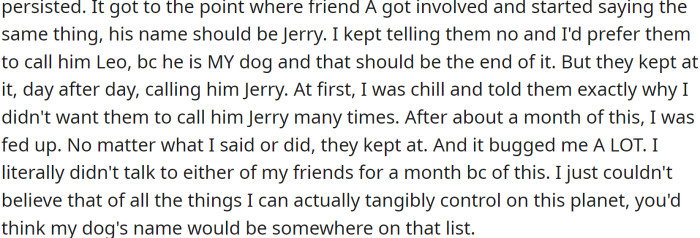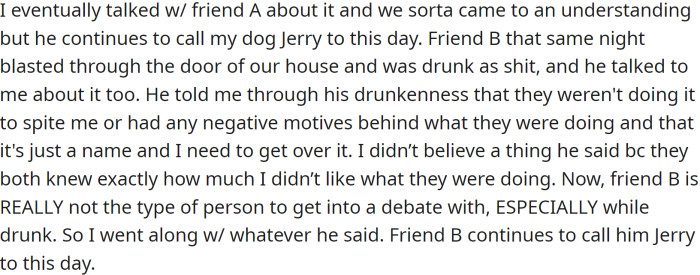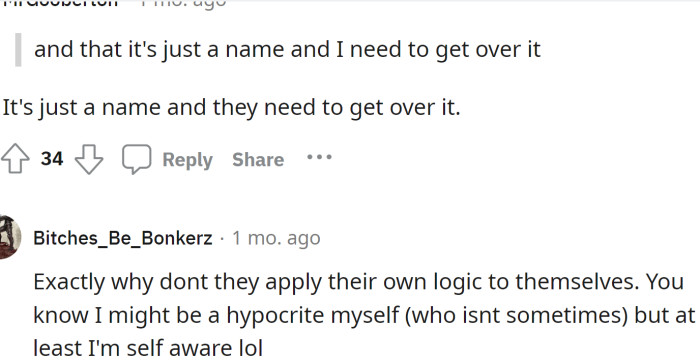Redditor Asks If He Is Wrong Being Angry With Friends For Renaming His Dog
Friendship is built on trust, shared interests, and a mutual understanding that you can be yourself around each other. It's not uncommon for friends to tease each other for fun, which can often signify a strong bond.
However, this playful teasing can sometimes escalate into something more significant, and lines can get crossed. In the beginning, teasing may seem harmless, and it can be enjoyable for both parties involved.
It can create a sense of comfort and familiarity between friends, and it's a way of showing affection. However, teasing can quickly spiral out of control as it becomes more frequent.
OP, a 22-year-old male, was living with two friends, both males and 21 years old. After eight or nine months, OP decided to adopt a dog from a shelter to have more structure in his life because he missed the companionship of a dog.
He named the dog Leo. However, his friends suggested renaming the dog Jerry, like the dad from Rick and Morty. OP did not want to change the name of his new dog and asked his friends to call him Leo.
But his friends persisted and kept calling the dog Jerry, which caused OP to stop talking to them for a month. He eventually talked to Friend A, and they came to an understanding, but Friend B still calls the dog Jerry.
OP has since moved out but is still upset that his friends continue to call his dog Jerry. He wonders if he is justified in feeling upset or if he is the one in the wrong.
OP asks:

OP is a young guy living with two friends, both young men.

After eight or nine months, OP decided to adopt a dog from a shelter to have more structure in his life because he missed the companionship of a dog.

The Psychological Attachment to Pets
Renaming a pet can evoke strong emotional reactions, particularly when the pet serves as a source of companionship and identity.
Research in the field of attachment theory suggests that pets often become extensions of their owners' identities, leading to feelings of possessiveness and ownership.
When a friend renames a beloved pet, it can feel like a violation of that emotional bond.
He named the dog Leo. However, his friends suggested renaming the dog Jerry, like the dad from Rick and Morty.

He eventually talked to Friend A, and they came to an understanding, but Friend B still calls the dog Jerry.

OP has since moved out but is still upset that his friends continue to call his dog Jerry.

According to studies published in the Journal of Applied Animal Welfare Science, pets are often considered family members, and their names carry significant emotional value.
This attachment can lead to heightened sensitivity around personal boundaries, especially when those boundaries are perceived to be crossed.
Understanding this can help individuals navigate conflicts more compassionately.
OP has offered the following explanation for why they think they might be the a-hole:

And this:

"What kind of friends are these?"

Friendship and Boundaries
This situation underscores the importance of boundaries in friendships.
Research indicates that clear boundaries are essential for maintaining healthy relationships, as they establish respect for individual preferences and feelings.
In this case, the friend may not have recognized the significance of the original name, leading to unintended conflict.
OP responded:

Just a name

Maybe OP should start calling them by a different name

A behavioral psychologist would suggest that addressing this conflict requires open communication about feelings and expectations.
Studies show that expressing personal feelings can help clarify misunderstandings and foster mutual respect.
Encouraging the friend to understand the emotional significance of the pet's name may help resolve the issue amicably.
Why the drama? Is it worth it?

It is clear they are not friends

OP is bullied and deserves better friends.

Effective Communication Strategies
To resolve conflicts like these, it's crucial to develop effective communication strategies.
One approach is to use 'I' statements, which can help express feelings without sounding accusatory.
For example, saying 'I feel uncomfortable when my pet is called a different name' can open a dialogue without creating defensiveness.
When jokes become personal or touch on sensitive subjects, they can be hurtful and damaging to the friendship. What may seem like harmless teasing to one person may not be perceived the same way by someone else.
If left unchecked, it can create resentment and cause friends to drift apart. It's important for friends to be aware of each other's boundaries and to communicate if something is bothering them.
If teasing does cross a line, it's crucial to address it directly and with kindness. A conversation can help clear the air and prevent further damage to the friendship.
Additionally, engaging in empathetic listening can create an environment where both parties feel heard.
Research indicates that practicing active listening leads to stronger relationships and better conflict resolution outcomes.
By validating each other's feelings, friends can rebuild trust and understanding.
Psychological Analysis
This scenario illustrates the depth of emotional attachment people can have to their pets, often viewing them as extensions of themselves.
The renaming of a pet can feel like a personal affront, leading to conflicts that stem from misunderstanding rather than malice. Encouraging open conversations about feelings and preferences can help clear up these misunderstandings.
Analysis generated by AI
Analysis & Alternative Approaches
In summary, the emotional attachment we have to our pets can complicate interpersonal relationships, particularly when boundaries are crossed.
Understanding the psychological principles behind these feelings can help individuals navigate conflicts more effectively.
By fostering open communication and empathy, friends can strengthen their bonds and resolve misunderstandings.



